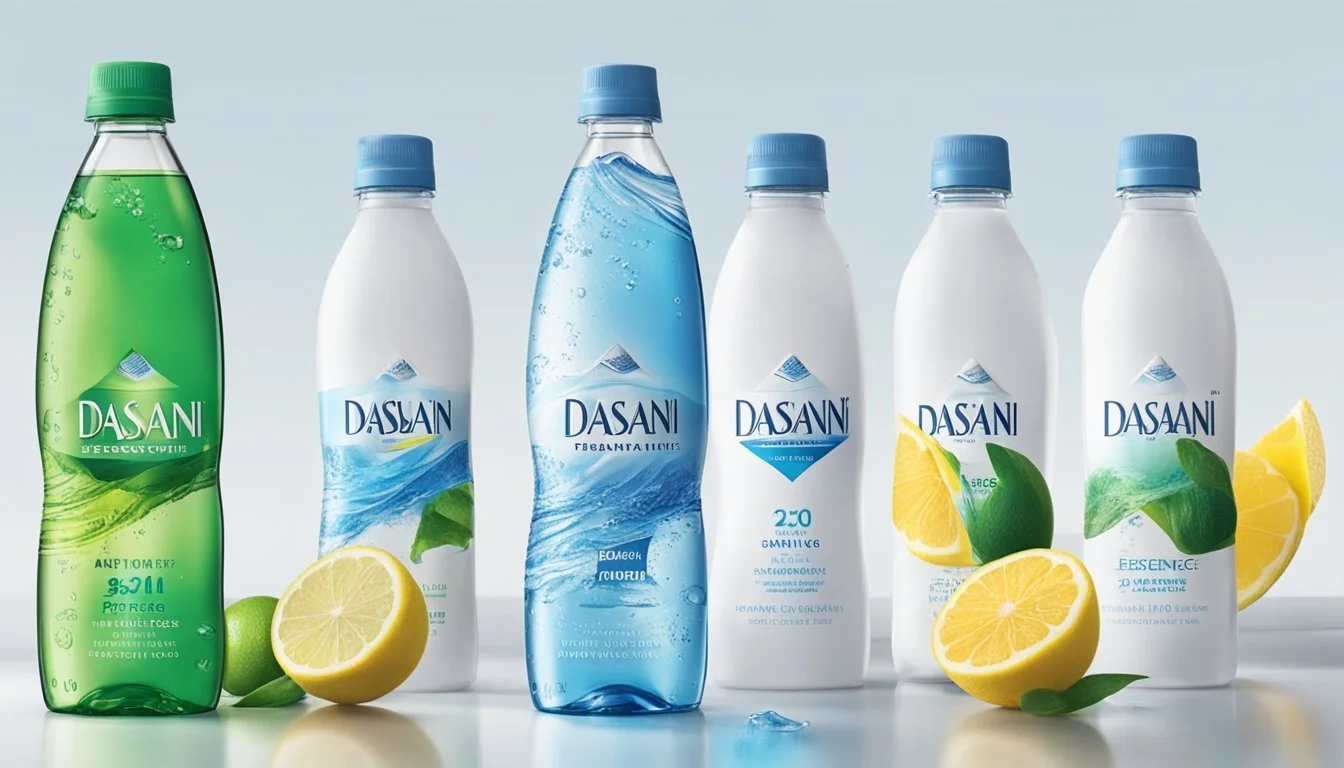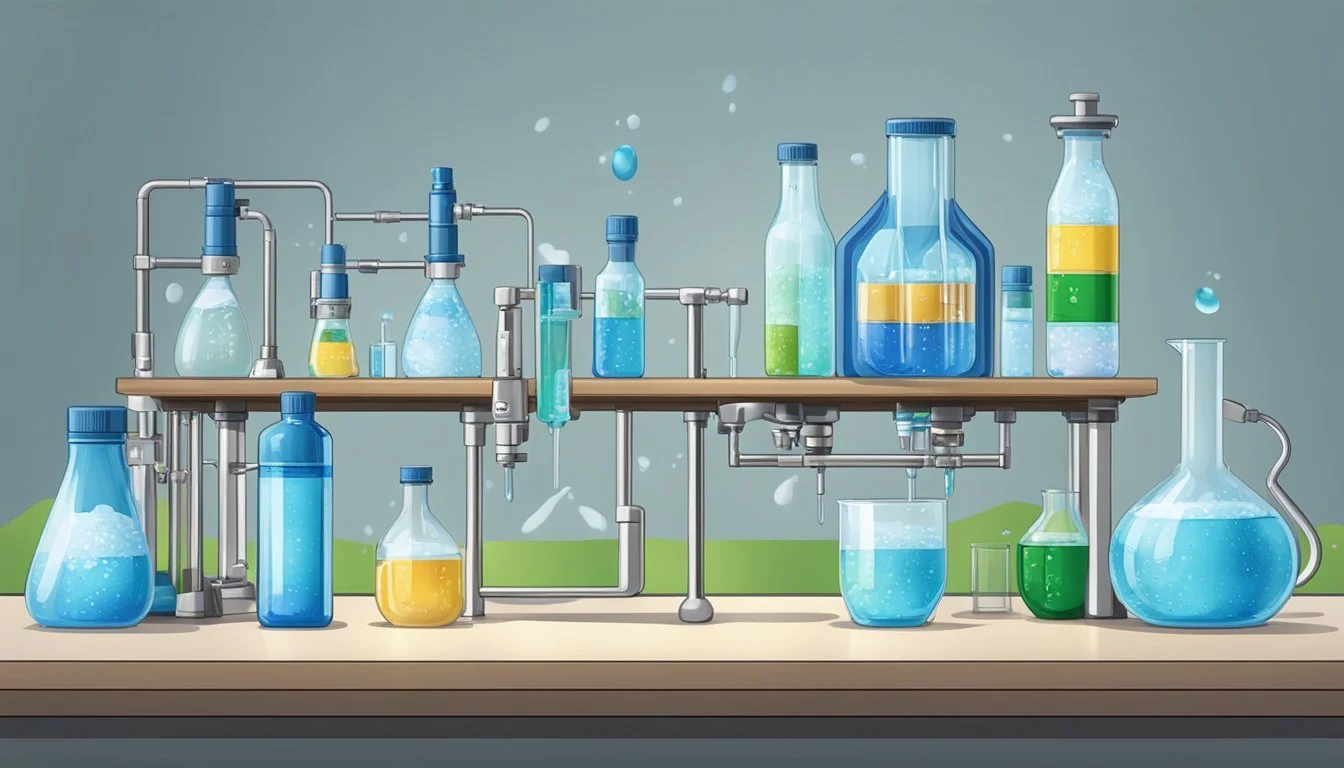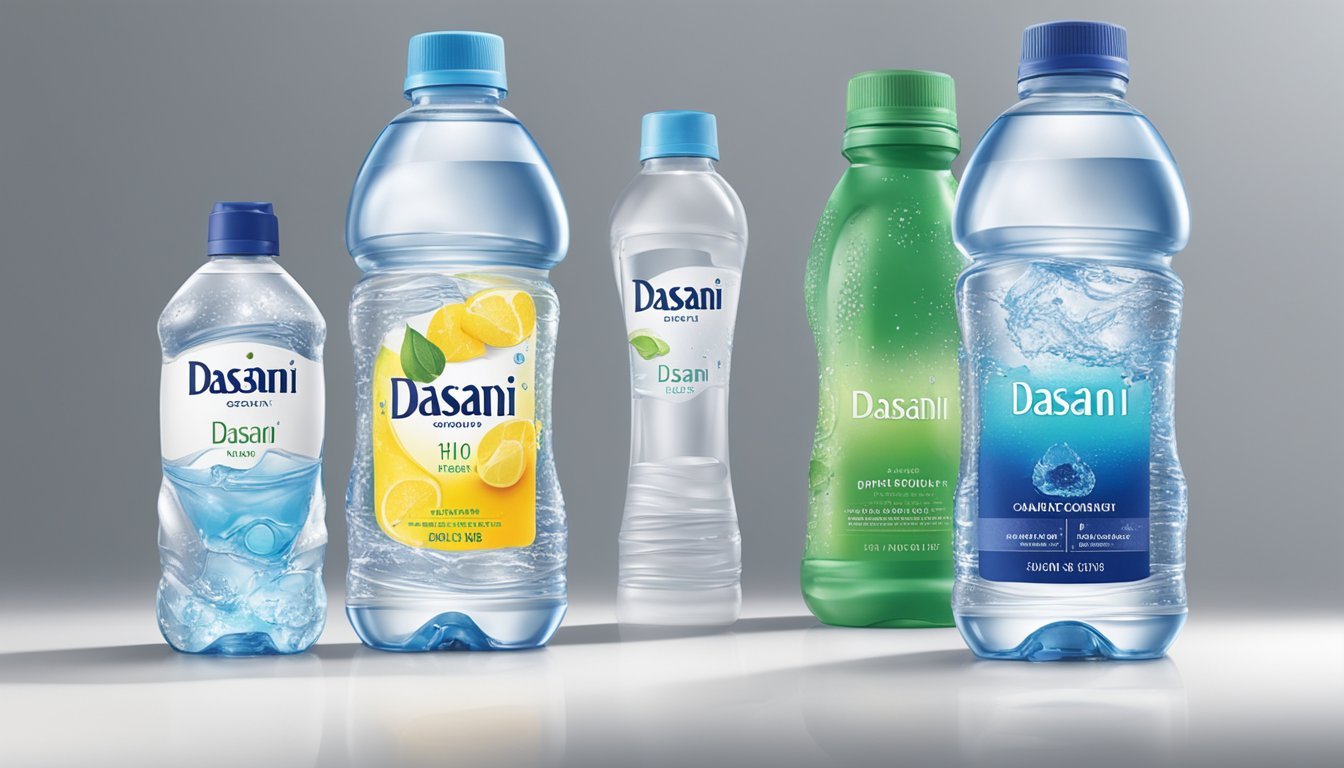Dasani vs. Essence pH10
Which Bottled Water Offers Superior Quality?
In the quest for the best bottled water, consumers often find themselves choosing between popular brands like Dasani and Essence pH10. Dasani, produced by Coca-Cola, is known for its purified and enhanced water, containing a blend of minerals for a fresh and clean taste. Essence pH10, on the other hand, prides itself on offering high pH alkaline water, which aims to provide superior hydration.
When comparing Dasani and Essence pH10, Essence pH10 offers a significant advantage with its high alkalinity, which many believe enhances hydration and balances bodily pH levels. Dasani’s purified water with added minerals maintains a clean, reliable taste, but it doesn’t offer the same alkaline benefits as Essence pH10. This essential difference often leads consumers seeking quality hydration to favor Essence pH10 for its purported health advantages.
Despite the differences in water composition and pH levels, both Dasani and Essence pH10 are packaged with convenience in mind, making them accessible options for those on the go. Whether you prioritize the potential health benefits of alkaline water or the steady reliability of purified water with added minerals, understanding the unique qualities of each brand can help you make an informed choice.
Background and Overview
Dasani is a popular bottled water brand produced by Coca-Cola. It is known for its purification process that includes reverse osmosis and the addition of minerals like magnesium sulfate, potassium chloride, and salt. These minerals give Dasani its distinct taste, often described as having a slight mineral flavor.
Essentia is another major player in the bottled water market, distinguished by its claim to be alkaline water with a pH level of 9.5 or higher. The brand employs a unique ionization process to achieve this, focusing on maintaining high pH levels for purported health benefits. Essentia markets itself as offering a clean, smooth taste.
Taste is a subjective parameter for both brands. Dasani's added minerals result in a more pronounced flavor, whereas Essentia's high pH and ionized water tend to provide a neutral and smooth drinking experience.
Key Comparisons:
Brand Origin:
Dasani: Produced by Coca-Cola.
Essentia: Independent brand, focuses on alkaline water.
Filtration & Purification:
Dasani: Uses reverse osmosis and mineral additives.
Essentia: Ionization process to achieve high pH.
pH Level:
Dasani: Typically close to neutral (7).
Essentia: Highly alkaline (9.5+).
Minerals:
Dasani: Contains added minerals like magnesium sulfate and potassium chloride.
Essentia: Focus on ionized and alkaline aspects.
Understanding these key differences provides a foundational overview of what sets Dasani and Essentia apart in the competitive market of bottled water.
Source and Filtration
Both Dasani and Essentia bottled waters undergo extensive filtration processes to ensure they meet high standards of purity and taste. Dasani starts with locally sourced tap water, while Essentia employs a more specialized purification method.
Dasani Source and Filtration Methods
Dasani begins with locally sourced tap water. This base water undergoes a multi-step filtration process to remove impurities and contaminants. The purification involves reverse osmosis filtration, ensuring clean and pure water.
After filtration, Dasani adds a blend of minerals such as magnesium sulfate, potassium chloride, and salt. These enhance the taste, giving it a distinct flavor. The water is packaged in 100% recyclable bottles, promoting sustainability.
Dasani’s filtration techniques ensure the water is consistent in taste and quality. This method retains essential electrolytes, contributing to a pleasant mineral flavor. The multi-step process ensures the water is free from harmful substances while maintaining a refreshing taste.
Essentia Source and Filtration Methods
Essentia utilizes tap water as its source, but the purification process sets it apart. The water goes through Essentia's proprietary Hydro-7™ technology, a complex ionization process. This multi-stage system removes dissolved solids and contaminants including heavy metals and chlorine.
Reverse osmosis is the first step in Essentia's filtration, followed by a carbon filtration to eliminate organic impurities. It undergoes UV light treatment to neutralize any remaining bacteria or viruses. The final step in the Hydro-7 process involves adding a precise mix of electrolytes for improved hydration and taste.
Essentia's thorough purification methods result in water with a higher pH level, typically around 9.5. This ensures a crisp, clean taste that stands out among other bottled waters.
pH Levels and Health Implications
The pH level of bottled water can significantly impact its taste and potential health benefits. This section explores the pH differences between Dasani and Essence pH10.
Understanding pH in Bottled Water
pH measures the acidity or alkalinity of a substance. A pH of 7 is neutral; below 7 is acidic, and above 7 is alkaline. Bottled water typically aims for a pH between 6.5 and 8.5.
Dasani water usually has a pH around 5.6, making it slightly acidic. Essence pH10, on the other hand, boasts a higher pH of 10, categorizing it as alkaline.
Health Benefits and Concerns
Alkaline water proponents claim benefits such as improved hydration and balancing body pH. Essence pH10 fits this description, providing potential advantages due to its high alkalinity. It may also contain essential minerals like magnesium sulfate and potassium chloride.
Conversely, acidic water like Dasani could enhance the taste for some but generally offers fewer health benefits. Key considerations involve understanding how each type interacts with the body and any potential contaminants.
Each brand caters to different health needs, making pH an essential factor in choosing between Dasani and Essence pH10.
Taste Profile and Mineral Content
Understanding the taste and mineral content of Dasani and Essentia is essential for discerning which bottled water might suit different preferences. Each brand offers unique characteristics that influence its flavor and overall drinking experience.
Dasani Taste and Additives
Dasani boasts a distinct mineral flavor, attributed to the added electrolytes like magnesium sulfate, potassium chloride, and sodium chloride. These additives aim to enhance the water’s taste and balance, providing a slightly crisp sensation.
Consumers often notice a unique taste due to these minerals. Taste tests reveal that Dasani’s flavor can be polarizing: some appreciate the sharpness, while others prefer a more neutral palate. This specific mineral content is designed to create a refreshing experience, but it can make the water taste less natural to some drinkers.
Essentia Taste and Purity
Essentia is known for its high alkaline level, with a pH of 9.5 or higher, which is significantly elevated compared to many other brands. This high pH contributes to a smooth and clean taste, void of any noticeable additives.
Essentia prides itself on its purity, using a process that filters out contaminants and infuses the water with essential minerals like calcium, potassium, and magnesium. This process results in water that is both pure and palatable, often favored in taste tests for its neutral and smooth profile. Water sommeliers commonly recommend Essentia for those seeking high-quality, pure, and taste-neutral drinking water.
Environmental and Ethical Considerations
Dasani, produced by The Coca-Cola Company, is packaged in bottles made from 100% recyclable PET plastic. This contributes to reducing waste and promoting recycling. It is also notable for being sourced from municipal water supplies, undergoing rigorous purification.
Essence pH10 offers an alternative with alkaline water, often valued for its high pH levels. This brand places emphasis on eco-friendly packaging, using materials that are easier to recycle and minimize environmental impact.
Brand Packaging Water Source Dasani 100% recyclable PET plastic Municipal water supplies Essence pH10 Eco-friendly recyclable materials Spring water
Consumers increasingly prioritize the environmental impact of bottled water. Essentia and Voss also claim to use sustainable packaging options, while Fiji Water and Evian highlight their natural groundwater sources. These sourcing methods often involve significant ethical considerations, such as the conservation of ecosystems and fair trade practices.
Nestlé Pure Life, Poland Spring, Deer Park, and Zephyrhills are owned by Nestlé, a company frequently scrutinized for its water extraction practices and environmental policies. Ethical considerations include the impact on local water resources and the long-term sustainability of these sources.
Aquafina, another popular brand, is similar to Dasani in using municipal water sources but is produced by PepsiCo. Both brands focus on purification processes to ensure quality and safety, with attention to environmentally responsible practices.
By evaluating these aspects, consumers can make informed choices about the environmental and ethical impacts of their bottled water preferences. This balanced approach ensures that both brands and consumers play a part in promoting sustainability.
Product Accessibility and Options
Dasani is widely accessible and commonly found in major grocery stores, convenience stores, and vending machines across the United States and many international markets. It provides various bottle sizes ranging from small, portable bottles to larger, family-sized options.
Essence pH10 water, though gaining popularity, is less universally available compared to Dasani. It is commonly found in health food stores and specialty organic markets, and also available for order online. They offer a range of bottle sizes, typically targeted towards health-conscious consumers.
Brand Accessibility Available Sizes Dasani Widely available 12 oz, 16.9 oz, 20 oz, 1 liter Essence pH10 Limited distribution 1 liter, 1.5 liter
Comparison with Other Brands
Smartwater: Found in many of the same locations as Dasani, often seen in premium sections.
Fiji: Available in most grocery stores, emphasizes its natural artesian origins.
Poland Spring: Regionally available in the Northeast US, multiple sizes.
Nestlé Pure Life: Globally accessible, often in bulk sizes.
Aquafina: Comparable to Dasani in terms of availability and sizing.
Regional Brands
Mountain Valley Spring Water: Often available in upscale grocery stores and online.
Arrowhead: Predominantly found on the West Coast of the US.
Zephyrhills: Commonly distributed in the Southeastern US.
Ice Mountain: Mainly focused on the Midwest market.
Health-Oriented Options
Core Hydration: Emphasizes balanced pH, commonly found in health-focused stores.
Life Wtr: Widely accessible, marketed for its electrolytes and artistic packaging.
Acqua Panna: Available in fine dining establishments, offers a luxury bottled water experience.
Both Dasani and Essence pH10 cater to different market segments, making their accessibility and options varied based on consumer needs and regional availability.
Consumer Preferences and Behaviors
Consumers have distinct preferences when it comes to bottled water. Taste remains a top priority. Many find Dasani's added mineral salts enhance its flavor, giving it a distinct taste. Essence pH10, with its alkaline properties, often appeals to those seeking a smoother taste with purported health benefits.
Personal preference plays a significant role. Some prefer the crisp, mineral-infused flavor of Dasani, while others lean towards the neutral taste of Essence pH10. Taste tests can highlight these differences, revealing the subtleties that influence consumer decisions.
Water sommeliers, who specialize in the nuances of water flavors, often note the electrolytes in Dasani contribute to its distinctive taste profile. In contrast, Essence pH10's appeal lies in its higher pH level, which some believe offers superior hydration.
Gatorade drinkers may find Dasani familiar due to its mineral composition. On the other hand, those who avoid additives often choose Essence pH10 for its minimalistic approach to water enhancement.
Overall, consumer behaviors are influenced by taste, perceived health benefits, and brand loyalty. Both Dasani and Essence pH10 have carved out loyal followings based on these preferences.
Controversies and Common Criticisms
Dasani has faced several controversies, particularly regarding its quality and production process. One major point of contention is that Dasani is essentially purified tap water. Critics argue that paying a premium for what is fundamentally filtered tap water is unwarranted.
Bromate, a chemical byproduct, has also been a source of concern. In 2004, Dasani was found to contain bromate above the allowable limits in the UK, leading to a recall. This incident raised questions about the safety and oversight of bottled water.
Shane Dawson, a popular YouTuber, brought further controversy in 2020 when he suggested that additives in Dasani water might be problematic. This claim led to widespread debate, although the FDA has deemed the additives safe.
Essence pH10 has not faced similar widespread scrutiny. While both brands are subject to FDA regulations, Dasani's criticisms have arguably stemmed from its association with larger corporate practices.
Comparison of Common Criticisms:
Aspect Dasani Essence pH10 Source Purified Tap Water Natural Spring Water Additives Contains Added Minerals Naturally Occurring Minerals Major Controversy Bromate Incident, Shane Dawson Claims Minimal Known Controversies Regulatory Body FDA FDA
Despite these controversies, Dasani continues to be popular. Essence pH10, in contrast, is marketed for its natural spring source and high pH level, which appeals to a different segment of consumers. So, while Essence pH10 may avoid the same level of criticism, Dasani's issues primarily stem from its production and marketing practices.
Final Assessment
When comparing Dasani and Essentia pH10, several factors come into play.
Dasani uses a reverse osmosis filtration process and enhances its water with a proprietary blend of minerals to improve taste. This process results in a clean, crisp flavor that some consumers prefer. Additionally, Dasani is packaged in 100% recyclable materials, emphasizing its commitment to environmental impact.
Essentia pH10 distinguishes itself with its high pH level of 10, promoting alkalinity. This characteristic can be appealing to those seeking a balanced body pH. Essentia uses ionization to remove acidic ions, resulting in water that some find exceptionally hydrating. The added electrolytes contribute to its unique taste, which many describe as smooth and refreshing.
Here's a comparison table for quick reference:
Feature Dasani Essentia pH10 pH Level Approximately 5.6 10 Filtration Reverse osmosis Ionization Minerals Proprietary blend for taste enhancement Electrolytes added for taste and hydration Taste Clean, crisp Smooth, refreshing Environment 100% recyclable bottles Focus on hydration benefits
In terms of water quality, both brands utilize advanced purification methods. Dasani focuses on mineral balance to enhance flavor, while Essentia emphasizes high alkalinity and hydration through its ionization process.
When considering hydration, Essentia's high pH level and added electrolytes may offer an edge. However, taste preference is subjective and varies among individuals.
Environmental impact is a shared concern, with both brands offering recyclable packaging options.
For those who prioritize minerals and a clean flavor, Dasani might be the better choice. For those seeking high pH levels and enhanced hydration, Essentia pH10 stands out. Each brand offers distinct benefits, allowing consumers to choose based on their personal preferences and needs.
More About Dasani
Dasani vs Mountain Valley Spring Water: Which Bottled Water is Better?
Kirkland Signature vs Dasani: Which Bottled Water is Better?
Richard's Rainwater vs Dasani: Which Bottled Water is Better?
Whole Foods Italian Still Mineral water vs Dasani: Which Bottled Water is Better?
More About Essence pH10
Aqua Carpatica vs Essence pH10: Which Bottled Water is Better?
Cascade Mountain vs Essence pH10: Which Bottled Water is Better?
Core Hydration vs Essence pH10: Which Bottled Water is Better?
Crystal Geyser vs Essence pH10: Which Bottled Water is Better?
Crystal Lake vs Essence pH10: Which Bottled Water is Better?
Hawaii Volcanic vs Essence pH10: Which Bottled Water is Better?
Hawaiian Springs vs Essence pH10: Which Bottled Water is Better?
Ice Mountain vs Essence pH10: Which Bottled Water is Better?
Icelandic Glacial vs Essence pH10: Which Bottled Water is Better?
Kirkland Signature vs Essence pH10: Which Bottled Water is Better?
Liquid Death vs Essence pH10: Which Bottled Water is Better?
Mountain Valley Spring Water vs Essence pH10: Which Bottled Water is Better?
Nestle Pure Life vs Essence pH10: Which Bottled Water is Better?
Poland Spring vs Essence pH10: Which Bottled Water is Better?
Proud Source vs Essence pH10: Which Bottled Water is Better?
Purely Sedona vs Essence pH10: Which Bottled Water is Better?
Richard's Rainwater vs Essence pH10: Which Bottled Water is Better?
San Pellegrino vs Essence pH10: Which Bottled Water is Better?
Simple Truth vs Essence pH10: Which Bottled Water is Better?
Solan de Cabras vs Essence pH10: Which Bottled Water is Better?
Talking Rain AQA vs Essence pH10: Which Bottled Water is Better?
Whole Foods 365 vs Essence pH10: Which Bottled Water is Better?
Whole Foods Italian Still Mineral water vs Essence pH10: Which Bottled Water is Better?







